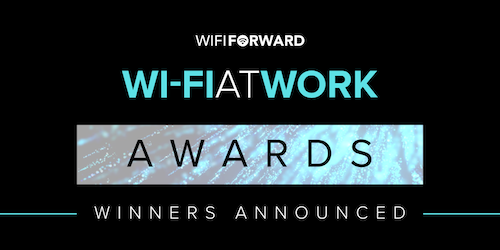If you’re looking for an innovative way to help your community, look to these organizations making an impact—with Wi-Fi. We honored 16 rockstars who stepped up to connect their communities with Wi-Fi, enabling them to meet vital needs during the pandemic.
WifiForward’s inaugural Wi-Fi At Work Awards recognize organizations that have kept communities connected via Wi-Fi, during COVID-19. Wi-Fi has proven itself an essential service, allowing millions of Americans to remain connected amidst a once-in-a-generation pandemic. But it’s not available to everyone everywhere yet, and that’s where these Wi-Fi heroes come in.
Many local libraries, including award winners Contra Costa County Library (CA), Montclair Public Library (NJ), Newton County Library (MO) and First Regional Library (MS) offered hotspots for patrons’ use. School districts joined in with hotspots for both virtual learners and the public. Lockland Local School District (OH), Mosinee School District (WI) and Council Bluffs Community School District (IA) made sure to prioritize students in underserved areas.
Other awardees expanded into vehicular Wi-Fi offerings: The Texarkana, Arkansas, School District purchased a bus equipped with Wi-Fi that will perform double duty for community events, such as home visits, off-campus parent/teacher conferences, registration and family and health resource fairs. Similarly, Hawaii Kids Can (HI) and Gloucester County Public Schools (NJ) offered opportunities for students in poorly-connected areas to get online via roving bus hotspots.
The Mason Public Utility District 3 (WA) offered “Drive-In Wi-Fi,” allowing residents to “drive up to one of these designated locations, pull up and stay in their car for appropriate social distancing, and then log in.”
Still others took the opportunity to build and expand community Wi-Fi networks. One Neighborhood Connects (RI) was behind the push to expand their Community Wi-Fi, covering all of the organization’s affordable housing as well as schools, rec centers and parks.
And notably, the South Carolina Office of Regulatory Staff created one of the first citizens broadband radio service (CBRS) networks in the country. The private LTE network transmits signals to homes using a band of radio frequency spectrum the Federal Communications Commission made available for the first time last year.
WifiForward is pleased to present these 16 Wi-Fi At Work Award Winners for inspiration:
Comcast – Lift Zones: Provided more than 1,000 Wi-Fi-connected “Lift Zones” in local community centers nationwide where students, adults, seniors and veterans can get online.
Contra Costa County Library: Allowed residents to check out portable Wi-Fi hotspots that enable up to 10 smartphones, laptops and tablets at a time to connect to the hotspot devices.
Council Bluffs Community School District (CBCSD): Partnered with the city and local technology companies to build out a multipurpose community Wi-Fi network in phases, beginning with the most high-poverty neighborhoods.
Extreme Networks – Novant Health Collaboration: With Extreme Networks’ cloud-managed Wi-Fi solution, Novant Health deployed Wi-Fi access points on rolling carts across a temporary mass vaccination facility in under one hour, resulting in the administration of 4x the number of vaccines a typical clinic administers in a day.
First Regional Library: Purchased about 200 hotspot devices available to check out for free at all 14 of their locations.
Gloucester County: Outfitted school bus to act as a hotspot “on steroids,” with a wireless router inside and antenna on the roof that helps the router better connect to cellular towers, serving an estimated 750 students in Gloucester County Public Schools.
Hawaii Kids Can: Deployed 15 vans with a dash-mounted router, cables and rooftop antenna delivering high-speed internet for about 130 simultaneous users.
Libraries Without Borders: Humanitarian non-profit partnering with private and public sector actors to connect people to books and digital resources, expanding the reach of libraries, training facilitators in post-emergency situations and addressing the needs of under-resourced communities.
Lockland Local School District: Partnered with local government and Cincinnati Bell to offer 15 free, public Wi-Fi hotspots in public areas and apartment complexes that house high numbers of Lockland students, through grants from the state of Ohio, CARES Act funding and help from local nonprofit organizations.
Mason Public Utility District (PUD) 3: Offered 28 “Drive-By Wi-Fi” locations at a variety of parks, fire stations, community halls, port authority offices and rural schools.
Montclair Public Library: Bought 20 mobile hotspots using federal CARES Act funding to be borrowed by seniors who don’t have internet access at home.
Mosinee School District: Supplied 100 personal hotspots for students without reliable internet, with priority for those virtually learning, in addition to providing Wi-Fi buses for kids to come and visit when they needed internet.
Newton County Library: Purchased Wi-Fi hotspots with the help of an $11,000 broadband grant available for checkout, with some reserved for Eastern Newton County residents who don’t have internet access.
One Neighborhood Connects Community Wi-Fi: Installed a free community wireless network designed to help residents meet the challenges presented by COVID-19, covering all of the organization’s affordable housing as well as schools, rec centers and parks.
South Carolina Office of Regulatory Staff: Implemented a private LTE network called a citizens broadband radio service (CBRS), one of the first in the country, to transmit signals to homes using a band of radio frequency spectrum the Federal Communications Commission made available for the first time last year.
The Texarkana, Arkansas, School District: Purchased a WiFi-outfitted bus for students who do not have internet access and to host community events.
“Wi-Fi is a literal lifeline,” said Ellen Satterwhite, spokesperson for WifiForward. “So many organizations found creative ways to bring this lifeline to more people when they needed it most. These Wi-Fi At Work Awards recognize these remarkable organizations. On behalf of all our coalition members, we are pleased to honor this vital work to connect our communities.”

